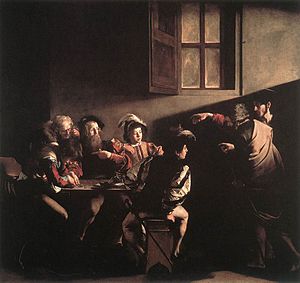"The Calling of St. Matthew" by Caravaggio
a particularly meaningful painting for Pope Francis
Our pope seems a very interesting, reflective and holy man, judging from this transcript of an interview recently conducted by fellow Jesuit Anthony Spadaro. It bears reading in its entirety. I especially liked this part:
“I pray the breviary every morning. I like to pray with the psalms. Then, later, I celebrate Mass. I pray the Rosary. What I really prefer is adoration in the evening, even when I get distracted and think of other things, or even fall asleep praying. In the evening then, between seven and eight o’clock, I stay in front of the Blessed Sacrament for an hour in adoration. But I pray mentally even when I am waiting at the dentist or at other times of the day.
Prayer for me is always a prayer full of memory, of recollection, even the memory of my own history or what the Lord has done in his church or in a particular parish.... And I ask myself: ‘What have I done for Christ? What am I doing for Christ? What should I do for Christ?’ ... But above all, I also know that the Lord remembers me. I can forget about him, but I know that he never, ever forgets me. ... It is this memory that makes me his son and that makes me a father, too."

